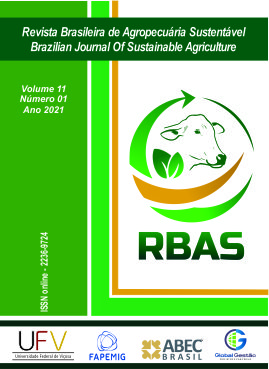FITOSSOCIOLOGIA EM DIFERENTES SISTEMAS DE USO DA TERRA NA ZONA RURAL DE CAMETÁ (PARÁ, BRASIL)
DOI:
https://doi.org/10.21206/rbas.v11i1.10513Keywords:
Sistema agroflorestal, pimenta-do-reino, monocultura.Abstract
The phytosociological study is a tool that allows making several inferences about the flora of rural properties. This work aimed to carry out a phytosociological survey of different land use systems in a rural property in the Bosque Menino Jesus community, Cametá (Pará, Brazil). The study was carried out in three different productive systems: A1 - agroforestry system, A2 - monoculture of Piper nigrum (black pepper), A3 - agroforestry system implanted in a monoculture of P. nigrum. The frequency of occurrence, density, relative abundance and the indexes of diversity and equitability were evaluated. Twenty-six species were identified, distributed in 14 families, the most representative are: Fabaceae (7 spp.), Meliaceae (3 spp.), and Anacardiaceae (2 spp.). Piper nigrum was present in the three areas, being the most representative in terms of frequency of occurrence and abundance, mainly in areas A2 and A3. Among the study areas, A1 presents the greatest diversity with equitable distribution of species. In general, the phytosanitary status of the plants was good, with the presence mainly of grasshopper and ant. The results demonstrate the recent implementation of the agroforestry system and the increase in species diversity.
Downloads
Downloads
Published
How to Cite
Issue
Section
License
Copyright (c) 2021 Brazilian Journal of Sustainable Agriculture

This work is licensed under a Creative Commons Attribution-NonCommercial-NoDerivatives 4.0 International License.
1. Proposta de Política para Periódicos de Acesso Livre
Autores que publicam nesta revista concordam com os seguintes termos:
Autores mantém os direitos autorais e concedem à revista o direito de primeira publicação, com o trabalho simultaneamente licenciado sob a Licença Creative Commons Attribution que permite o compartilhamento do trabalho com reconhecimento da autoria e publicação inicial nesta revista.











